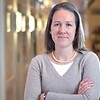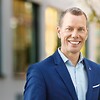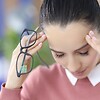Fritextsökning
Artiklar per år
Innehållstyper
-

ALS – When the body has given up, but the brain persists
The nerve disease ALS gradually deprives the patient of control over the muscles and, eventually, also of speech. The eyes continue to function, though, and with the help of, among other things, a Swedish-developed invention, communication with the outside world can continue. “It’s their window to the world,” says ALS researcher Caroline Ingre.
-

Swedish breakthrough in Alzheimer’s: “We can finally present great data”
Treatments for Alzheimer’s disease are currently among the hottest topics in drug development. Two Swedish research companies with high ambitions and successes in the field participated in Bioscience 2022 conference at Life City in Hagastaden, Stockholm.
-

Neanderthal genes and Nobel Prize in a popular lecture at Bioscience
An inherited gene variant from our ”evolutionary cousins” – the extinct Neanderthals – may affect how our bodies break down certain drugs. “It’s only a matter of time before we actively start screening for it,” said KI researcher Hugo Zeberg when describing the study at Bioscience 2022.
-

Alert from the Swedish Medicines Agency: Many complications with gastric balloons
According to the Swedish Medicines Agency, an increasing number of serious complications are being reported in procedures with gastric balloons as a method for weight loss. The authority fears significant shortcomings in the information to patients both before and after the procedure.
-

“We need to build flexible operating theatres”
Flexible operating theatres, micro-sensors on surgeons to monitor their well-being and 3D images projected onto organs to be operated on. These are a few ideas that three specialist surgeons are suggesting for the operating theatre of the future.
-
Business Sweden’s new team is rolling out the blue-yellow carpet
According to Business Sweden’s life science team, the combination of substantial medical know-how and an ever-flourishing tech sector is a success factor for Sweden. “It’s a perfect storm, a beneficent, perfect storm,” says Programme Manager Britta Stenson.
-

Marie Gårdmark: Potential step change – EU regulators get to play with data
A new pilot from EMA is starting in September to assess wether the analysis of 'raw data' by regulatory authorities improves the evaluation of marketing approval for new medicines. Marie Grådmark writes in a column that she is looking forward to the outcome of the pilot to hopefully then understand if “in house” analyses actually will add value.
-

Anna Törner: Kalashnikovs in a new guise
Thanks to resisting European regulatory authorities, Europe has been spared the opioid epidemic. In the 1960s, the situation was the opposite as the American pharmaceutical authority, the Food and Drug Administration (FDA), refused to approve thalidomide (Neurosedyn), writes Anna Törner in a column.
-

Amorphous materials take centre stage when Orexo develops new formulations
Swift resolution but with maintained stability. Orexo’s new drug delivery platform tackles the problem of amorphous materials. “Our technology has the positive properties of the material, and it also cracks some of the problems,” says the company’s Research and Development Manager Robert Rönn.
-

Göran Stiernstedt: “We are the world’s worst at continuity”
Failed investments in primary care, an unreasonable system with online doctors and a public failure at coordinating the healthcare IT system. Göran Stiernstedt does not mind his language when describing the shortcomings of today’s healthcare system. “It makes me extremely frustrated,” he says.
-

Marie Gårdmark: New incentives for orphan products on its way
"Let’s hope that the learnings from development of new therapies for rare diseases will spill over to more common conditions, orphan products paving the wave for drug development in a broader context", writes Marie Gårdmark in a column.
-

The first vaccine derived from cowpox
The British rural doctor could not forget the words of the peasant girl. Could that really be true? A couple of decades later, on 14 May 1796, he performed the world’s first smallpox vaccination, and a medical breakthrough had occurred.
-

No demand for new Covid vaccine – “It will probably be discarded”
So far, just under 6 000 doses of the Covid vaccine from Novavax have been used in Sweden, leaving over 1.4 million doses in stock. “They will probably be discarded due to lack of demand in Sweden as well as globally,” says Sweden’s National Vaccine Coordinator Richard Bergström to Life Science Sweden.
-

Hello Angelica Loskog!
Life Science Sweden would like to know more about Angelica Loskog and interviews her about her life as a researcher.
-

Noxious parasite forms hybrids and deceives the immune system
The small parasite Trypanosoma cruzi has a nasty ability to cause serious illness. Researchers at the Karolinska Institutet have now mapped its ability to deceive the immune system by forming new variants that are mixtures of different strains.
-

New rules for diagnostic products, but who will certify them? “An extreme shortage area”
In less than two weeks, new and stricter EU rules will enter into force for thousands of products used in important diagnoses of, among other things, cancer and Covid-19. However, not one single institute in the entire Nordic region is able to certify the diagnostics companies’ products according to the new regulations. “In the end, it risks affecting patients,” says Anna Lefèvre Skjöldebrand, CEO of Swedish Medtech.
-

When carelessness, forgetfulness and coincidence become the researcher’s best friend
Forgetfulness, coincidence and a stroke of luck hardly make up a fruitful method of serious research. Or do they? Actually, a number of important medical advances have come about thanks to completely random incidents and the open-mindedness of scientists who were ready to think outside the box.
-

Lucy Robertshaw: Are we in the perfect storm?
“Is there a perfect storm on the horizon again as elective surgeries were cancelled due to patients being admitted with Covid-19? We now have a long backlog of people who are presenting with chronic diseases that need to access healthcare again”, writes Lucy Robertshaw in a column.
-

This is how Anette Steenberg will put Medicon Valley on the world map
Anette Steenberg has been CEO of the Swedish-Danish life science cluster Medicon Valley Alliance since 1 November last year. Life Science Sweden called her to ask about her visions and the challenges of merging the worlds of Swedish and Danish life science.
-

Björn Ursing: Physicians new role in AI driven healthcare
”AI could be the key we need for tomorrow’s healthcare, but it is not a stand-alone tool”, writes Björn Ursing in a column about how the role for physicians changes in the era of AI.
-

LabDays tillbaka i Stockholm igen i april
50-tal utställare på fackmässan som är tillbaka med full kraft efter pandemin.
-

Elicera develops CAR-T against solid tumours – may become the first in the world
Today, there are five EU-approved CAR-T therapies, all focused on different types of blood cancer, but no one has yet succeeded in making the method work against solid tumours. At Gothenburg-based Elicera, they are working relentlessly to succeed in that field as well. “It is the largest field, and the potential is enormous,” says the company’s CEO Jamal El-Mosleh.
-

Björn Arvidsson: ”We need to change perspective”
If you say “life science” to a person on the street and ask them to explain what it is, you will probably get no good answer. The same question to your network will generate as many versions as the people you ask. Most likely, we will miss many opportunities with our lack of communication, writes Björn Arvidsson in a column.
-

Study: An objective diagnosis of constant tinnitus may be possible
A new method that measures brain activity during sound stimulation can make it possible to objectively diagnose and identify people who suffer from constant tinnitus, which was demonstrated in a study made by researchers at the Karolinska Institute.